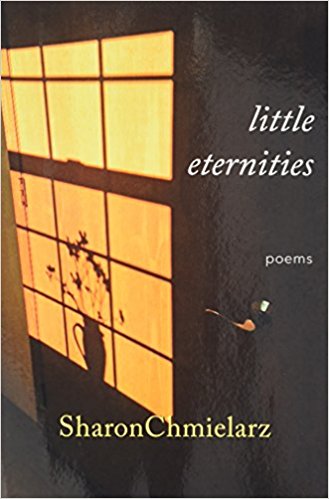| <- Back to main page |
(Nodin Press)

We last met Sharon Chmielarz in The Widow's House, a theme-based collection built around an architecture of lament. Little eternities, by contrast, takes to the open road. Poems come at us from all directions, in the form of sparrows and pumpkins and village bakeries, from etymological explorations to a Russian tea set to a poem about the fattest man in the world. If there is a central compass point here that we can use to orient ourselves, it would be time—several pieces hop in and out of different eras, and the title poem describes an absence of time encountered in a field of peonies:
Thus around noon
for long moments we were all together.
"Time Traveler" was a favorite of mine, which shouldn't be surprising, as I'm a time travel writer myself:
You are leaving
or arriving.
All the same
in deep time.
"Summer of 2013" also presents a traveler, who may or may not be moving back a century to 1913:
Now the young woman's slipping
on her good brown pumps.
Now she's sliding across the worn
plush bench and stands
in the train car's door.
From a notch of time
she surveys the platform's
crowd and then, nudged
by the minute and a passenger
behind her, she steps down.
The sheer sounds of the piece, alternating from the whispering ess of "woman's slipping" and "she's sliding across" to the delicious lip-smacking of "good brown pumps", "plush bench" and "platform," make you almost want to eat the poem. All this leads to the haunting image of the unwilling traveler about to dive back into the stream of time, "nudged by the minute."
Speaking of imagery from the past—we also have a couple of encounters with van Gogh. The first is at his house in "A White Rose Would Do for All My Troubles", which opens with the beautifully musical:
A trip to your dock, van Gogh, would do
or a stroll into your sky.
But two lines down, if feels as though we're talking to a skateboarder:
Don't be home because, dude,
the truth is you sort of scare me.
There's also room for a little music, courtesy of Baroque composer Dieterich Buxtehude, a apropos of which Chmielarz observes:
Humans are, in the end, strange animals
snuffling over bones we can't live without.
The open road also lends itself to nature, in scenes like "End of Winter":
Suddenly magic in the crab apple tree's blueprint of sticks—
twenty-one robins, five waxwings and a pine finch
helicopter in, marauders in a rite of late
winter siege, a feasting called staying alive.
These lyrical flights are offset by a dry thicket of the prose poems, many of them curious riffs on a single word ("Fyrd", "Thyme", "Bumble"). Off in the distance we catch the glimpse of "Chapel of the Mountain", told in the voice of the church itself:
I tell you my shoulders
thrill to the wash of currents
from church bells and wind.
Look. A man in black, in silhouette,
hurries toward me, his shirt tails flying.
Eventually we take a ferry ("Crossing the River", first published in Whistling Shade) piloted by another mysterious character:
The ferryman's an old timer,
a stout heart who delivers
his passengers to the shore
on the other side.
Leaving and arriving. And at journey's end, the little pieces of little eternities somehow fashion themselves into a cohesive whole—a winding, heterogeneous collection wandering across a landscape that is at the same time familiar and surreal, beautiful and disheveled, grand and intricate, and above all original. Which brings me back to "Time Traveler":
no one's seen it
like you've seen it.
- Joel Van Valin